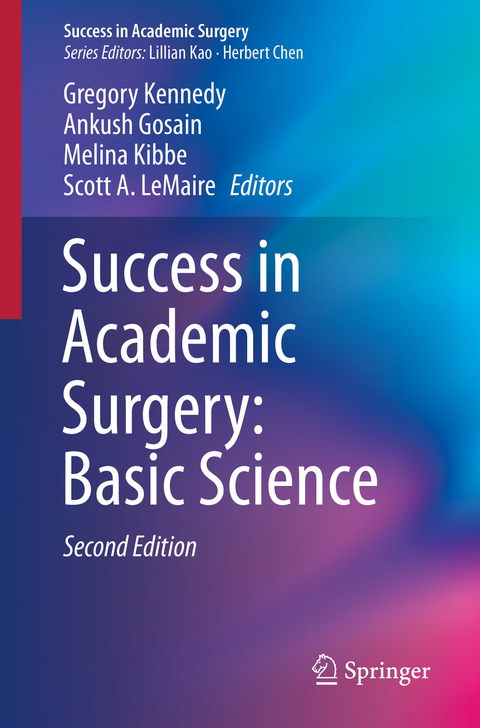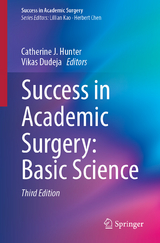
Success in Academic Surgery: Basic Science
Springer International Publishing (Verlag)
978-3-030-14643-6 (ISBN)
This updated volume provides the foundation for starting a basic science research career as an academic surgeon. Taking a practical approach, the book covers the suggested timeline for the initial academic appointment, including how to setup and fund the laboratory and identifying appropriate scientific mentors and lab personnel. It also describes the application of basic and advanced research techniques, including animal models, flow cytometry, gene editing, tissue engineering, and microbiome analysis.
Success in Academic Surgery: Basic Science aims to give guidance on the application of basic and advanced techniques in surgical research.
This book is relevant to senior residents and fellows approaching their first academic appointment, as well as more senior investigators interested in expanding their research horizons.
Greg Kennedy, MD, PhD graduated from the University of Washington School of Medicine and received his PHD in cancer biology from the University of Wisconsin where he also completed his general surgery training. He has extensive research experience runs a funded basic science laboratory that studies the role of the Aryl Hydrocarbon Receptor in colorectal carcinogenesis. He is currently the John H. Blue Chair of General Surgery and the Director of Gastrointestinal Surgery at the University of Alabama at Birmingham. Ankush Gosain, MD, PhD is an Associate Professor of Surgery and Pediatrics at the University of Tennessee Health Science Center and Director of Surgical Research at the Children's Foundation Research Institute of Le Bonheur Children's Hospital. His NIH-funded laboratory focuses on the development of the enteric nervous system and gastrointestinal mucosal immune system. The long-term goal of his research is to gain an understanding of the interactions between the enteric nervous and gastrointestinal immune systems in both development and disease to permit the generation of novel neuro-immunomodulatory therapies that may potentially target a broad range of congenital and acquired pediatric gastrointestinal tract diseases (Hirschsprung's disease, necrotizing enterocolitis, intestinal atresia, motility disorders, inflammatory bowel disease, etc.).
1. How to Set Up, Staff, and Fund Your Laboratory: The First 3 Years.- 2. Choosing a Good Scientific Mentor and Being a Good Mentee.- 3. Effective Time Management Strategies for Conducting Laboratory Research.- 4. Tips on Maintaining an Effective Lab Notebook & Data Integrity.- 5. Statistics for Bench Research.- 6. Ethics in Laboratory Research.- 7. Modern Techniques for DNA, RNA and Protein Assessment.- 8. Considerations for Immunohistochemistry.- 9. Utilizing Flow Cytometry Effectively.- 10. Effective Tissue and Cell Culture.- 11. Gene Editing Techniques.- 12. Stem cells and tissue engineering.- 13. Animal Models in Surgical Research (Genetic & Surgical Models).- 14. Microbiome: Current status and future applications.- 15. Systems Biology: Generating and Understanding Big Data.
"This book is written for surgeon scientists at various early stages in their career development. ... This will be a high-quality and very specific addition to the library of young surgeons aspiring to a career in academic surgery with a particular interest in bench research. ... I would recommend it to any surgeon doing bench research and/or translational research." (Carol Scott-Conner, Doody's Book Reviews, July 26, 2019)
“This book is written for surgeon scientists at various early stages in their career development. … This will be a high-quality and very specific addition to the library of young surgeons aspiring to a career in academic surgery with a particular interest in bench research. … I would recommend it to any surgeon doing bench research and/or translational research.” (Carol Scott‐Conner, Doody's Book Reviews, July 26, 2019)
| Erscheinungsdatum | 10.05.2019 |
|---|---|
| Reihe/Serie | Success in Academic Surgery |
| Zusatzinfo | VIII, 252 p. 34 illus., 25 illus. in color. |
| Verlagsort | Cham |
| Sprache | englisch |
| Maße | 155 x 235 mm |
| Gewicht | 493 g |
| Themenwelt | Sachbuch/Ratgeber ► Gesundheit / Leben / Psychologie |
| Medizin / Pharmazie ► Allgemeines / Lexika | |
| Medizin / Pharmazie ► Medizinische Fachgebiete ► Chirurgie | |
| Sozialwissenschaften ► Pädagogik | |
| Schlagworte | Basic and Translational Research • Ethics in Laboratory Research • flow cytometry • Gene Editing • immunohistochemistry • Laboratory Techniques • microbiome • systems biology • Tissue engineering |
| ISBN-10 | 3-030-14643-X / 303014643X |
| ISBN-13 | 978-3-030-14643-6 / 9783030146436 |
| Zustand | Neuware |
| Informationen gemäß Produktsicherheitsverordnung (GPSR) | |
| Haben Sie eine Frage zum Produkt? |
aus dem Bereich



